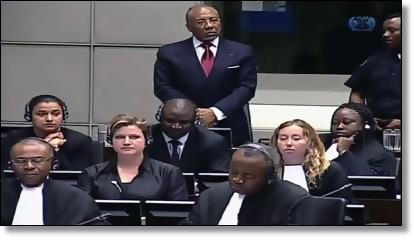Charles Taylor’s Sentence: No Need for Celebrations

 |
| Charles Taylor in court Photo courtesy |
Against this backdrop, let me admonish my dear country men and women in Liberia and Sierra Leone to beware and celebrate cautiously. ‘The daggers that killed the King’ are still hanging and might hit again. With the predictions of even more African leaders to be prosecuted and continuous decadence in governance, we Africans need to note the hidden hand in the so-called quest for justice in crimes against humanity.
Why does it have to be exclusively sub-Saharan African leaders, or is human rights violations now only exclusive to African leaders? If this trend continues, isn’t it time we Africans totally withdrew from obligations under the Rome Statute? The West who sort of personify global justice, see the Taylor prosecution as the best in upholding human rights and bringing justice. YES, I agree, but even though their claims makes some sense, it is still too premature to think that global justice has been pursued purely for its own sake. There is more to it than meets the ordinary eye.
There was no way President Taylor could have won his case. The court had sentenced Mr. Taylor even before listening to his argument. In a 2009 US diplomatic Cable, former US Ambassador to Liberia Linda Thomas-Greenfield is quoted to have remarked that if the Special Court for Sierra Leone were to acquit Charles Taylor or hand him a light sentence, the Mano River sub-region would be in jeopardy and unstable. How can it be international justice when only few Western countries – US, UK, Netherlands and Canada are financing it? Could it be that the Taylor sentencing has helped especially USA to achieve its long dream of getting Taylor out of their way at a moment when they want to plant their puppet and geopolitically control the sub region?
My argument is that if the real intention is to address impunity and build the peace, what explanations can the UN offer for both their costly and lengthy trials? After ten years of trial, the UN Special Court is said to have spent over $900 million (close to a billion dollars) and host 766 staff on an annual budget of $140 million. Is this fair or would it be directing such huge sums to post-conflict stability or providing for war victims like amputees, women and children?
I listened to reactions from both Sierra Leoneans and Liberians immediately when the former President was sentenced. Taylor’s former wife, now a senior senator Jewel Taylor noted that UN backed war crimes tribunals will never unite the people of Liberia and Sierra Leone but if anything, will end up having negative ripple effects. President Taylor has been sentenced not for ordering these crimes, but for aiding and abetting which is a form of liability and not a direct form of participation. What about the other actors who actually also aided this project? Like Jewel Taylor noted, wars do not come from the sky down to mankind, and there are no arms manufacturing factories in the two countries. A lot of powers, people from the West and at home provided resources for these war projects and are today walking freely. Could they not have aided and abetted these conflicts through their resources?
Finally, while the West obsessively celebrate their purported victory in international justice, there are thousands of war victims who are still suffering today. What about the war widows, amputees, rape victims, abducted children etc? Is it Justice without reparation? Liberians and Sierra Leoneans must carefully reflect on the decades of sufferings during the war and ask themselves if those vices that led to conflict are still around today. Post conflict development and stability will be difficult to enhance with selective justice, and without national reconciliation. The Truth and Reconciliation Commissions set up in the two countries emphasized on forgiveness and reconciliation, a virtue difficult to come by if more people are aggrieved by selective justice.
Let us celebrate that national reconciliation and forgiveness has been achieved through our local efforts and not because of a purported trans-national justice.
Dr. Brima Patrick Kapuwa
Institute of International Studies, Jilin University, China.
